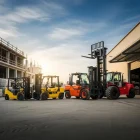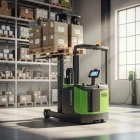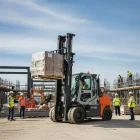All terrain forklifts are robust machines. They’re designed to handle tough conditions and heavy loads.
But like any machinery, they need regular care. Proper maintenance can extend their lifespan and ensure optimal performance.
This article provides practical tips for maintaining your all terrain forklift. It covers everything from pre-operation inspections to professional servicing.
By following these guidelines, you can keep your forklift running smoothly. You’ll also enhance safety and efficiency in your operations.
Understanding the Importance of Regular Maintenance
Regular maintenance is crucial for your all terrain forklift. It prevents unexpected breakdowns and reduces repair costs. This leads to improved safety for operators and workers on site.
Consistent care also ensures the forklift runs at peak efficiency. This boosts productivity and decreases fuel consumption. In the long run, diligent maintenance preserves the equipment’s resale value, providing greater financial return.
Pre-Operation Inspection Checklist
Conducting a pre-operation inspection is essential for safe forklift use. It helps identify issues before they become major problems. Regular checks can prevent costly repairs and safety hazards.
Before each shift, operators should inspect various components. Attention to detail during these checks ensures smoother operations. It also instils a proactive maintenance culture within the team.
Here’s a checklist for your inspections:
- Check fluid levels, such as oil and coolant.
- Inspect tires for proper pressure and signs of wear.
- Test safety features like the horn, lights, and seat belt.
Make these inspections a routine. They only take a few minutes but can save a lot of trouble. Prioritising these checks enhances the lifespan of your forklift.
Fluids and Lubricants: The Lifeblood of Your Forklift
Fluids and lubricants are essential for keeping your all terrain forklift running smoothly. They reduce friction, prevent overheating, and ensure optimal performance. Neglecting these elements can lead to severe mechanical issues.
Using the correct fluids and lubricants is crucial. Each forklift model may have specific requirements. Refer to the operator’s manual to understand the right products to use.
Regular maintenance involves more than just topping off these fluids. It’s about keeping them clean and contaminant-free. This ensures that your forklift operates efficiently throughout its lifetime.
Checking and Maintaining Fluid Levels
Checking fluid levels frequently is essential for forklift longevity. Begin by assessing hydraulic oil, engine oil, and coolant. These levels should meet the specifications outlined in the manual.
Routine checks help prevent unexpected breakdowns. Address any noticeable drops in levels promptly to avoid damage. When levels are low, refill using the correct type of fluid.
Always inspect for leaks during these checks. Identifying and fixing leaks early saves significant repair costs. Keep a record of maintenance activities to monitor fluid consumption trends.
Selecting the Right Type of Fluids and Lubricants
Choosing the right fluids and lubricants is vital for effective forklift maintenance. Consult your forklift’s manual to identify the recommended types. Using improper products can harm your machine over time.
Manufacturers specify fluids based on the forklift’s design and operating conditions. Follow these guidelines to maintain efficiency and avoid warranty issues. Sticking to recommended products ensures compatibility and performance.
Selecting high-quality fluids contributes to the forklift’s long-term health. They protect the engine and hydraulic systems, ensuring all components function optimally.
Tire Maintenance and Replacement
Tire maintenance is a critical aspect of all terrain forklift care. Properly maintained tires ensure better traction and performance on various surfaces. Regular checks can prevent costly downtimes and safety issues.
Inspect tire pressure at routine intervals to enhance stability and load-bearing capacity. Under-inflated tires wear out faster and can cause accidents. Maintaining the right pressure prolongs tire life and reduces damage risk.
When tire wear becomes evident, replacement is necessary. Ignoring worn tires compromises forklift safety and efficiency. Always use replacement tires that match the manufacturer’s specifications for best performance.
Identifying Common Tire Problems
Several signs indicate tire issues that require immediate attention. Watch for uneven wear patterns, which may suggest alignment problems or improper inflation. These issues, if left unresolved, can worsen quickly.
Cracks or cuts in the tire tread are also warning signs. Such damages increase the risk of tire failure, especially on rugged terrains. Regular inspection helps you identify these problems early.
Pay attention to any vibrations or noise changes during operation. These may signal internal tire damage. Addressing these indicators promptly helps maintain the forklift’s operational integrity.
Battery and Electrical System Care
Keeping the battery charged and in good condition is vital for forklift efficiency. Regular inspections should be part of your forklift maintenance routine. Check for corrosion and ensure connections are tight.
Monitor battery water levels frequently and top up with distilled water when necessary. This simple step can prevent battery damage. A well-maintained battery extends the operational hours of your all terrain forklift.
Don’t overlook the electrical system. Examine cables and wiring for any signs of wear or damage. Faulty electrical components can lead to unexpected downtimes or safety hazards. Regular electrical maintenance ensures smooth operation.
Maintaining the Mast, Forks, and Attachments
The mast and forks endure substantial stress during operation. Regular inspections are crucial to detect any signs of wear or damage. Keeping these parts in good condition ensures safe and efficient load handling.
Look for bends, cracks, or deformities in the forks. These issues can affect load stability. If damage is found, replace the forks immediately to prevent accidents or further damage.
Attachments also need attention. Clean them regularly to remove debris and inspect for any wear. Proper maintenance of attachments enhances their lifespan and performance, keeping them reliable for various tasks.
The Role of Operator Habits in Forklift Maintenance
Operators play a crucial role in maintaining forklift health. Their driving habits can significantly impact wear and tear. Smooth handling and attentive operation reduce stress on the machine components.
Proper training in forklift use is essential. Educated operators are more likely to follow best practices, reducing maintenance needs. Encouraging vigilant driving habits can prolong the forklift’s lifespan and optimise its performance.
Professional Servicing and When to Seek Expert Maintenance
When looking for an all terrain forklift for sale, regular professional servicing is essential for optimal forklift performance. Experts can spot potential issues early. They ensure that all systems are functioning properly as part of the all terrain forklift maintenance.
Seek expert maintenance when issues arise beyond routine checks. Complex problems often require specialised knowledge. Entrusting your forklift to professionals can prevent costly repairs and downtime, extending its life.
Keeping a Detailed Maintenance Log
A maintenance log is more than just a record. It’s a vital tool for tracking service history and repairs. Keeping detailed records helps you identify patterns, anticipate issues, and ensure timely maintenance.
Document every inspection, repair, and part replacement. This practice supports warranty claims and confirms compliance with manufacturer guidelines. Moreover, a well-maintained log can enhance your forklift’s resale value.
Conclusion: The Long-Term Benefits of Diligent Maintenance
Regular maintenance extends your all terrain forklift’s life and improves efficiency. By following maintenance tips and practices, you reduce downtime and repairs. This proactive approach boosts safety and performance, ensuring reliable operation.
Investing in maintenance is investing in your equipment’s future. Proper upkeep saves money over time and increases the forklift’s resale value. Diligent care ensures your forklift remains a valuable asset.




